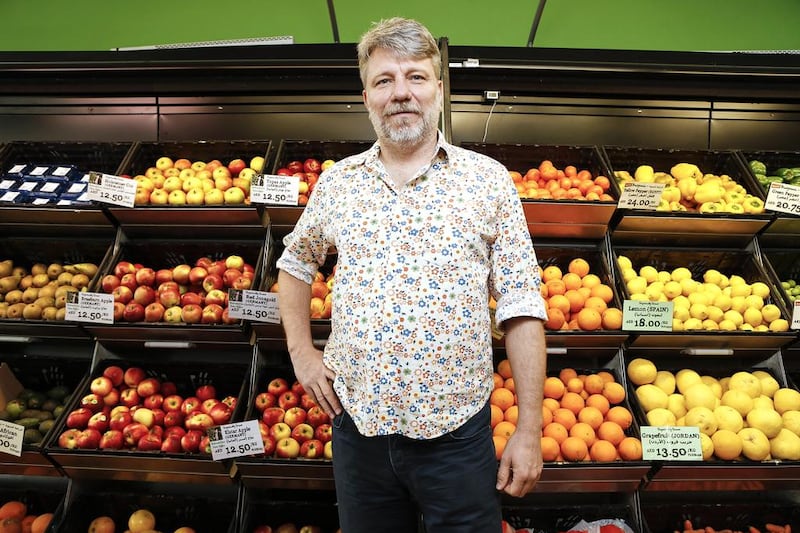When Nils El Accad talks to the family farmers who supply his Organic Foods & Café about what made them go organic, it's the same story over and over again - the Big C.
Mr El Accad first encountered organic food around the time his German mother developed cancer when he was a teenager. In her battle against the disease, she introduced raw food and milk to the family diet, but died when he was 21.
Then in his mid-20s Mr El Accad contracted a mystery sickness, with dizzy spells and sensitivity to bright lights. Resorting to homeopaths, he was told to stop putting toxins in his body. Still he continued on the same path, with the same diet, until one day 11 years ago, he had what he says was his "calling".
"I woke up and I went around the world sourcing organic food. It was the same story over and over with the farmers: someone died; someone got cancer," he says. "When was the last time you took antibiotics? I haven't in 11 years - I don't get sick any more. Neither do my three kids." This week, his farmers came from far and wide - South Africa, Uganda, Germany, New Zealand - to celebrate the brand's 10th anniversary. "Nils is certainly the most passionate of all our customers," says Matt O'Leary, an Australian beef farmer.
Raised in the UAE but born in Braunschweig near Hanover, Mr El Accad, now 45, says he could never have ventured into his line of business without his roots in the organic heartland of Germany. In 2005 he opened his first store in Satwa in Dubai. This week, on its 10th anniversary, his flagship store stands on Sheikh Zayed Road on the site of his family's first warehouse; his Syrian father opened Modern Bakery in 1975. There are now five stores in the UAE - three in Dubai and two in Abu Dhabi - as well as one in Bahrain, and Mr El Accad plans to expand across the GCC starting with Kuwait and Qatar.
"The food industry is not about nutrition, it's about money. We have stayed true to our core values - buying from family farms, keeping food healthy and sustainable. Only a few items come from publicly listed companies, as they don't fit with our philosophy," says Mr El Accad.
"Even organic has gone mainstream; it's been bought out. That's why I prefer biodynamic [a green farming movement] - it was the first standard of organic. Farming should be in harmony with nature."
However, buying organic food can be costly for the consumer and during the recession following the global financial crisis of 2008-09, the entrepreneur says he almost went bankrupt.
He was losing Dh500,000 a month and estimates he was two months from insolvency. "But we didn't close stores and we didn't lose any staff," he says proudly.
Today the company has 340 staff. He won't say what Organic Foods makes now in profits, but confirms it is profitable.
"If it's not profitable, it's not sustainable. You can't lose money forever," adds Mr El Accad, who worked for his father in the food industry before going it alone. "I lost a tonne of money for a long time but I believe in what I do. If you're passionate, you can hardly fail. Most people would have given up. I made a tonne of money before . for what, to be sick? People are too interested in money."
Shaikha, an Al Ain farmer who supplies the stores with vegetables, fruit, chicken and eggs, agrees. "Dubai is so urbanised," she said. "People may drive Ferraris but half their family is sick. Locals have high rates of diabetes and obesity - we encourage them towards better eating and living."
Walking around his store, Mr El Accad can randomly pick and articulately discuss the origins and story of dozens of his 10,000 products, right down to the brand's own-label honey, which he had made with cocoa to entice his own kids and their friends away from Nutella.
In the future, the businessman would still like to see the UAE do more to help make farming more environmentally friendly. "Desalination of water has a bigger carbon footprint than air freight," he says. "Water is a scarce resource. Dibba, Fujairah, these are flourishing organic communities - give them solar desalination."
In recent times, his client base has expanded dramatically from what was once almost exclusively western - helped by marketing his stores to the Emirati community. Mr El Accad is proud to say his customers now range from royalty to an Indian bus driver, who waits for the 20 per cent sale days each month to buy his baby's food. "What more could you ask for?" he adds.
business@thenational.ae
Follow The National's Business section on Twitter
Going the organic way in the UAE
It's 10 years since the entrepreneur Nils El Accad first launched his Organic Foods & Café brand in the UAE. Today he has five stores in the Emirates and one in Bahrain.

Editor's picks
More from the national




